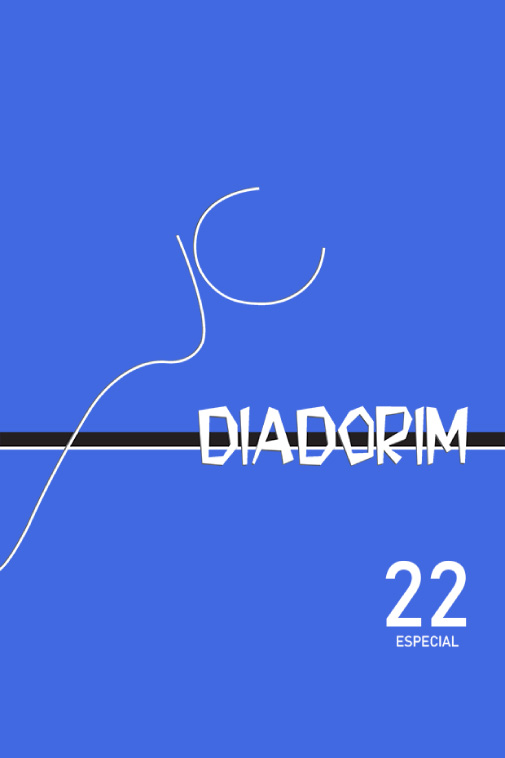Role-playing and masks in As vistas do Dr. Valdez by João Paulo Borges Coelho
DOI:
https://doi.org/10.35520/diadorim.2020.v22n3a36379Keywords:
power, colonial regime, independence, role-playing, masksAbstract
In the novel As Visitas do Dr. Valdez, by João Paulo Borges COELHO, role-playing and masks (literal or figurative) are central topics, connected to power or submission within social relationships, during the transition between the colonial regime and independence in Mozambique. They serve several purposes in the story, such as to invoke the past and insert it into the rapidly changing present – through the mask of Dr. Valdez concocted by Vicente -; to momentarily extend a political and social order that is progressively wearing away – through the authoritative mask of Sá Caetana - ; or to introduce without violence the essence of change into former colonial relationships, which predicts the end of the colonial way of living.
Sá Caetana, coming from a colonizing family, uses a traditional authoritative attitude towards Vicente that she does not wish to see subverted; a mask which she cannot forgo. Vicente, on the other hand, is divided between the submissive and obedient memory of his father, Cosme Paulino, who was a servant to the family, and the new callings of independence and decolonization. This role-playing and these masks lead the characters into a dead-lock without solution: the simultaneous impossibility of keeping up the role-playing or of dismantling it entirely. In this proposal, we aim to analyse how, in the story, wearing a certain social mask is both part of the colonial past and of the decolonized present and future, and how these masks represent an impediment to the creation of real and emotional connections.
References
ALVES, I. M. M. Ser Velho em As Visitas do Dr. Valdez de João Paulo Borges Coelho. Universidade de Aveiro, 2011. Dissertação de Mestrado em Línguas, Literaturas e Culturas, Universidade de Aveiro, 2011. Available at: http://www.retrievo.pt/record?id=oai:ria.ua.pt:10773/6876
BARBATO, L. F. T.; VEIGA, V. N. Um jogo de relações: os dependentes na obra As Visitas do Dr. Valdez. Revista Eletrônica Literatura e Autoritarismo, Nº 25, p.59-72, 2015. Available at: https://periodicos.ufsm.br/index.php/LA/index
COELHO, João Paulo Borges. As Visitas do Dr. Valdez. Lisboa: Caminho, 2004.
FORNOS, J. L. G. Desmascaramento do mundo colonial moçambicano em As Visitas do Dr. Valdez, de João Paulo Borges Coelho. Navegações, V. 7, Nº2, p. 194-199, 2014. Available at: http://revistaseletronicas.pucrs.br/ojs/index.php/navegacoes/article/view/21052
MARÇOLLA, B. A.. Identidade, alteridade e memória em As Visitas do Dr. Valdez, de Borges Coelho. Cadernos Cespuc de Pesquisa, Nº16, p.141-151, Belo Horizonte, 2007. Available at: http://periodicos.pucminas.br/index.php/cadernoscespuc/article/view/14768/11447
OLIVEIRA, N. S. Simulação e/ou dissimulação: reflexão sobre a estética em Memórias Póstumas de Brás Cubas e As Visitas do Dr. Valdez. SCRIPTA, V.16, Nº 31, p.119-138, Belo Horizonte: PUC Minas, 2012. Available at: https://www.researchgate.net/publication/284636965_Simulacao_eou_dissimulacao_reflexao_sobre_a_estetica_em_Memorias_postumas_de_Bras_Cubas_e_As_visitas_do_Dr_Valdez_DOI_-_105752P2358-34282012v16n31p119
SERAFIM, Y. O olhar por detrás da máscara em As Visitas do Dr. Valdez. Revista Decifrar, Vol. 04, Nº07, p. 19-30, Manaus: Amazonas: Brasil, 2016. Available at: http://www.periodicos.ufam.edu.br/Decifrar/issue/view/96
SILVA, L. A. M. G. A representação do «ishima» no romance As Visitas do Dr. Valdez de João Paulo Borges Coelho. São Paulo: Universidade de São Paulo/Faculdade de Filosofia, Letras e Ciências Humanas, s.d. Available at: https://uspdigital.usp.br/siicusp/cdOnlineTrabalhoVisualizarResumo?numeroInscricaoTrabalho=3339&numeroEdicao=22
Downloads
Published
Issue
Section
License
Copyright transfer -- Authorization to publication
If the submitted article is approved for publication, it is already agreed that the author authorizes UFRJ to reproduce it and publish it in Diadorim: revista de estudos linguísticos e literários, the terms "reproduction" and "publication" being understood as defined respectively by items VI and I of article 5 of Law 9610/98. The article can be accessed both by the World Wide Web (WWW) and by the printed version, with free consultation and reproduction of a copy of the article for the own use of those who consult. This authorization of publication is not limited in time, and UFRJ is responsible for maintaining the identification of the author of the article.

The journal Diadorim: revista de estudos linguísticos e literários is licensed under a Creative Commons Attribuition-NonCommercial 4.0 International (CC BY-NC 4.0).

